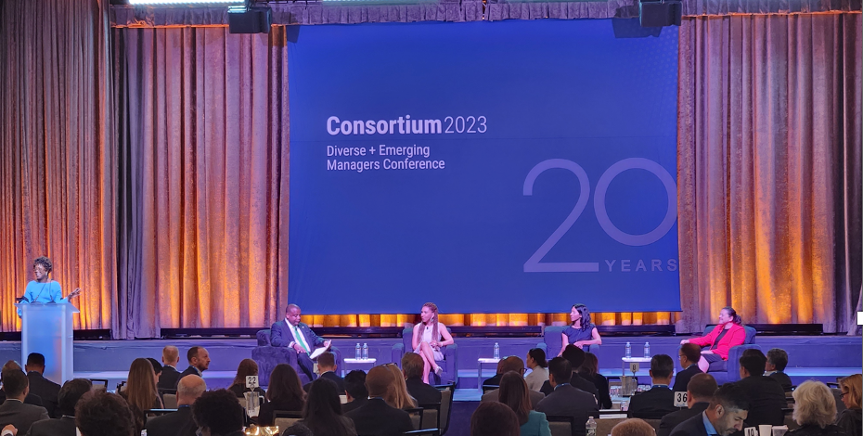At the 20th Annual Consortium hosted by GSM Grosvenor in NYC, a distinguished panel of investment executives discussed the fundraising environment for diverse and emerging fund managers. The fact that each of the three panelists, Tammy Jones, CEO of Basis Investment Group, Jennifer McElyea, Managing Partner of Ethos Real Estate, and Ivelisse Simon Rodriguez, Managing Partner at Avante Capital Partners, are not only successful founders, but women of color made a powerful statement and gave voice to fresh perspectives surrounding the investment landscape.
Joe Haslip, Managing Director at Valor Equity Partners, moderated the discussion. Conflicting philosophical perspectives quickly came to light when Haslip inquired as to whether the fundraising environment has gotten easier over the last twenty years. Ms. Jones did not shy away from the fact that fundraising remains the penultimate challenge for diverse managers of all sizes. “I will just keep it real as I always do. It is hard to raise capital and access to capital and credit is the single most challenge facing all of us. I heard the LPs talk about some of the progress that has been made and I agree with those statements. But I will tell you, I look at that 1.4% (% of diverse-lead funds), which means 98.6% of the capital is managed by white men, and I think about the last decade, it has moved 0.1% since 2011.”
Ms. McElyea echoed the sentiment, while emphasizing the positive role professional affinity groups have played in opening doors once closed for people of color. “The opportunity to get your foot into the door has gotten better. I would not be here if it weren’t for one of Consortium partner, SEO (Sponsors for Educational Opportunity), which really put me on Wall Street when I did not have a background of any kind that prepared me for that or would have made that a logical pathway for me. Even with all the initiatives that have been launched, and all of the talk that would suggest billions of dollars are available to diverse managers, it’s still extremely difficult.”
But Ms. Rodriguez took a decidedly more positive tone, choosing to focus less on difficulties and more on the magnitude of what had already been accomplished. “I am going to take a little bit of a different perspective. The 1.4% is obviously low and we are working very hard to change that, but 1.4% of $80 trillion is still $1 trillion dollars and that’s the GDP of Australia or Mexico. And so, we have already done a lot. And the question to me is what are we going to do with that? How many of us are we going to help launch? How many of us are we going to hire and train? We are not starting from zero. We are starting from the GDP of Australia. So, I am really encouraged and excited. The first time I came here was 15 years ago and I had a dream and wondered can I do this? And I did it. But not without the help of so many people. Without Renae Griffin (GSM Grosvenor Managing Director). GSM was our first investor. Derek Jones (GSM Vice Chairman) was our first investor. And they remained our investor all throughout these last 14 years and not only invested but supported us and gave us confidence. And now we sit here at a billion dollars (of AUM). And the next step is we will get to $5billion and then $10 billion.”
Ms. Jones pushed back on her colleague’s rosy take. “You know I had to come back at you. 1.4% is Australia but what is the 98.6%? The rest of the world! Several continents. So, it’s not enough. I don’t want to sound like I’m not grateful or excited by the progress has been made. We just have so much more work to do, and I want us to do more. I was in some Emerging Manager programs with NY Common and Artemis, but it was the GSM seed capital that really was catalyst for me raising my first commingled fund. I think people are also realizing that you may not necessarily raise a fund right away but maybe build track record by joint ventures, or co-invests, or separate accounts is also a way to go. I don’t know that I knew about those different structures.”
At the core of the exchange, and others to follow, was the question of how professionals of color take ownership over their own financial destinies, while holding historical gatekeepers of capital accountable to a more equitable distribution of resources and opportunities. It showcased a kind of symbiotic dance, whereby even in launching successful investment firms, they each had to find different ways to address their ever-present dependence on third-party capital providers.
For Rodriguez, it was casting a wide enough net and not focusing only on diversity or impact-focused LPs. “We shouldn’t limit ourselves to LPs who have diverse programs. We’re not just diverse, right? We’re investment managers. And so, if you go look to see all the investors that invested with Clearlake or Vista. There are hundreds and hundreds. And so those are all the investors that are open to us. In our last fund we had insurance companies and pension funds from Canada that had never invested in private credit. So, we are grateful to those who have allocations but those are not the only ones available to us. Go knock on everyone’s doors.”
But for Jones, who warned against chasing investors that show little interest or appreciation in your story, pragmatism ruled the day. “I 1000% agree with Ivelisse but I also think we have to be really honest with ourselves about the time we waste when we go places we are not welcome. I went to 125 LPs and wound up with 17 in my last fund. And obviously those statistics aren’t terrible. But you really should navigate to CIOs (Chief Investment Officers). My efforts were successful where I saw CIOs that were women on investment teams where I knew my story would actually resonate with them. You need to consider the cost involved in fundraising and how much time you can waste knocking on doors when you are not welcome.”
McElyea pushed it one step further, arguing that until compensation for employees of LPs is more strongly linked to deploying capital to diverse and emerging managers, inertia is be expected. “I hate to be a downer, but I’d look to know how much of the commitment post George Floyd was put to work. The discussion around how people are compensated based on the managers they chose and it’s probably a dated comment, but no one got fired for picking IBM. It’s always easier to say well that group failed but they have been around forever and will probably perform next year versus going with a newcomer that feels risky, notwithstanding the data saying otherwise. I think it’s just a bigger hurdle to get over and people have a harder time taking on that perceived risk and that’s what so disappointing. The data is available to suggest that would be the better place to invest.”
The discussion also delved into the financial trade-offs that come with raising a fund. When Haslip probed what a GP should be expected to give up in order to receive an anchor investment Jones explained. “In my experience and particularly in the real estate vertical there are folks that do want to a piece of your company. Sometimes it will be a limited percent of one fund to participate in the carried interest. So, I think that the good news is that there are creative structures so you can decide which structure best works for you. For me, I launched Basis, and I already had a partner. I decided that 100% of zero was zero back in 2009 in the GFC, so I did take a family office partner which enabled me to be able to scale. If anyone approached me about wanting an additional percentage in my company that was a non-starter. Know your non-starters and understand what you want to achieve.”
Ms.McElyea explained that expansion of the term “emerging manager” had created room for new entrants, particularly those earlier in their careers. “I think the definition of emerging manager has changed in a favorable way where it’s not that you already had to raise $1billion to be considered. And I’m extremely grateful to GSM Grosvenor for being our seed investor. And I think what really differentiated that platform from others we considered was we had working capital and working capital is so essential and such a huge barrier to getting started because you really can’t have a standing start. You need a team. You need the infrastructure. And unless you already come from wealth you created yourself or have friends and family with wealth that can get you started, it’s very circular. They’re bringing in emerging managers far earlier in their careers than we were seeing before, because it took me nearly 20 years to where we could get to the point to qualify to become an emerging manager.”
McElyea also predicted that the unique host of challenges impacting the global economy would create new opportunities for creative GPs. “I think the diversity of perspective and experience is exactly what is needed because what used to work is not working or will not work for a world that has gotten this complicated. It’s easier to get access to investors than it used to be and there are fewer gatekeepers. When you get that meeting, it’s really important to differentiate yourself and I think diversity is going to be an avenue to differentiate yourself. “
For Mr. Rodriquez, it was also important to remind professionals of color that their ability to excel in the face of adversity is a superpower. “I am originally from Puerto Rico, and I grew up in a very low-income neighborhood in Chicago. Growing up I never expected to be on this panel. I was the first person in my family to go to college. I know that’s a lot of people’s stories. And I feel like we are the movement. We are the movement. Tactical advice, since half of this group is new and looking to raise funds. You will hear a lot that it is hard. And it is. Oh gosh it’s hard. For sure. But it’s also necessary. You guys are the ones that have the track record. You are in this room for a reason. And you can do it. You can do it. We all did it. And you can do it too. There’s nothing any different between the managers getting hired and you. Other than you won’t fail. You won’t fail because so many of you came from places like I came from. We don’t fail. We can’t fail. And everyone that gets a call from a diverse manager in this room let’s answer that call.”
While the inspirational weight of Rodriguez’s words was felt strongly, Jones made it clear that funding gaps will never be addressed without being discussed head on. “I do think it’s important for us to talk about how hard it is because it will not change if we just say all the good. When we talk about Vista, Clearlake, and Clearview and all these different firms there aren’t many of us and I also don’t want us to just talk about entry. I’m tired of talking about launching. What about scaling? There’s no African American owned commercial firm that is like a Blackrock or KKR. When that happens, I will know we made real progress. I do think we need to talk about graduation. Those of you that control any type of diverse program please make sure you just don’t talk about entry. You talk about how to get folks into the direct portfolios because the way we will build wealth together it is to scale.” The Consortium panel offered great insight on the challenges diverse managers continue to face, not just in investment management, but in the broader pursuit of economic prosperity for their communities, while showcasing the incredible talent and accomplishments of three inspiring executives, and the positive impact (both economic and social) that can comes from sustained and consistent institutional investment in such managers.
Written by Vernon Beckford at [email protected]



